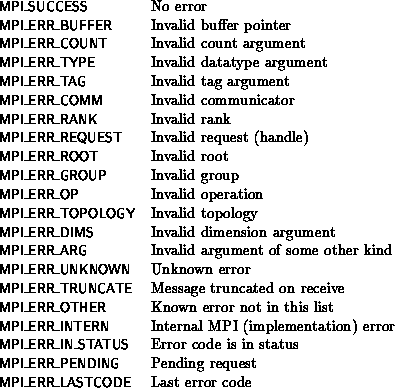MPI_Error_class
Converts an error code into an error classint MPI_Error_class( int errorcode, int *errorclass );
Parameters
- errorcode
- [in] Error code returned by an MPI routine
- errorclass
- [out] Error class associated with errorcode
Remarks
The error codes returned by MPI are left entirely to the implementation (with the exception of MPI_SUCCESS). This is done to allow an implementation to provide as much information as possible in the error code (for use with MPI_ERROR_STRING).
To make it possible for an application to interpret an error code, the routine MPI_ERROR_CLASS converts any error code into one of a small set of standard error codes, called error classes. Valid error classes include

The error classes are a subset of the error codes: an MPI function may return an error class number; and the function MPI_ERROR_STRING can be used to compute the error string associated with an error class.
The error codes satisfy,

Thread and Interrupt Safety
This routine is both thread- and interrupt-safe. This means that this routine may safely be used by multiple threads and from within a signal handler.
Notes for Fortran
All MPI routines in Fortran (except for MPI_WTIME and MPI_WTICK) have an additional argument ierr at the end of the argument list. ierr is an integer and has the same meaning as the return value of the routine in C. In Fortran, MPI routines are subroutines, and are invoked with the call statement.All MPI objects (e.g., MPI_Datatype, MPI_Comm) are of type INTEGER in Fortran.
Errors
All MPI routines (except MPI_Wtime and MPI_Wtick) return an error value; C routines as the value of the function and Fortran routines in the last argument. Before the value is returned, the current MPI error handler is called. By default, this error handler aborts the MPI job. The error handler may be changed with MPI_Comm_set_errhandler (for communicators), MPI_File_set_errhandler (for files), and MPI_Win_set_errhandler (for RMA windows). The MPI-1 routine MPI_Errhandler_set may be used but its use is deprecated. The predefined error handler MPI_ERRORS_RETURN may be used to cause error values to be returned. Note that MPI does not guarentee that an MPI program can continue past an error; however, MPI implementations will attempt to continue whenever possible.
- MPI_SUCCESS
- No error; MPI routine completed successfully.
Example Code
The following sample code illustrates MPI_Error_class.
#include "mpi.h"
#include <stdio.h>
int main(int
argc, char *argv[])
{
int rank, nprocs,
error, eclass, len;
char
estring[MPI_MAX_ERROR_STRING];
MPI_Init(&argc,&argv);
MPI_Errhandler_set(MPI_COMM_WORLD, MPI_ERRORS_RETURN);
/* Make an invalid call to generate an
error */
error = MPI_Bcast(NULL, 0, MPI_INT,
-1, MPI_COMM_WORLD);
MPI_Error_class(error, &eclass);
MPI_Error_string(error, estring, &len);
printf("Error %d: %s\n", eclass, estring);fflush(stdout);
MPI_Finalize();
return 0;
}
DOWNLOAD
Win32 DeinoMPI.2.0.1.msi
Win64 DeinoMPI.x64.2.0.1.msi